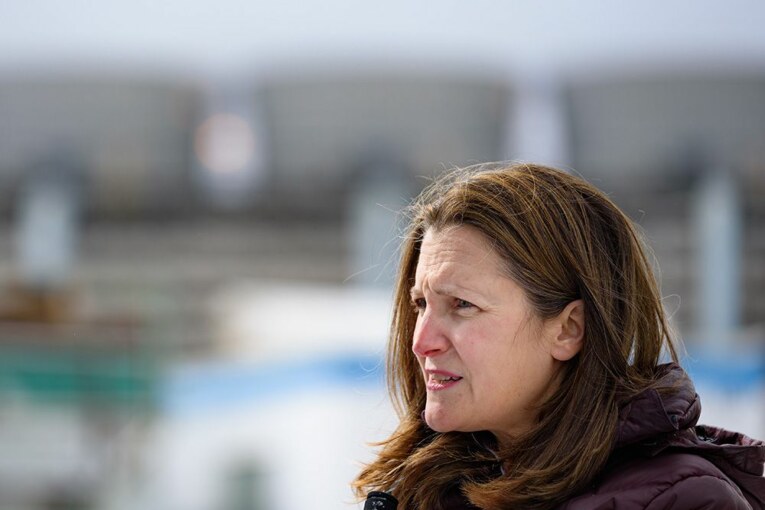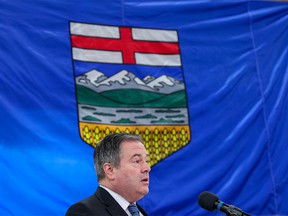
A bitterly cold wind swept through southeast Calgary on Thursday afternoon as federal Finance Minister Chrystia Freeland stopped in the city’s industrial area on a post-budget tour.
She visited the Alberta Carbon Conversion Technology Centre, which demonstrates various carbon capture and utilization initiatives in the province.
While cold weather dominated Thursday’s news conference, a little heat has been sparked in recent days by the federal government’s suggestion Alberta could provide its own incentives if it wants to see carbon capture, utilization and storage (CCUS) projects move ahead in the province.
In last week’s budget, Freeland unveiled details of a new federal investment tax credit for such developments.
It’s seen as a pivotal step to kick-start projects that will help the country’s oil and gas sector get to net-zero by 2050, capturing carbon dioxide emissions and burying them underground or using them in various industrial processes.
“You can’t see the excitement on my face because it’s a little bit frozen, so let me try hard to really smile . . . I really feel we are at the beginning of a new chapter for Alberta and Canada,” Freeland said.
“The federal government has come to the table. We have put together a powerful tax credit.”
Under the federal plan, companies can receive a 50 per cent tax credit for investing in equipment to capture CO2 in such projects, and a 37.5 per cent credit for spending on equipment used for transportation and storage on CCUS.
But the budget also made a point of noting it will talk “with relevant provinces in the expectation that they will further strengthen financial incentives to accelerate the adoption of CCUS technologies by industry.”
Let the squirming begin.
“I really see this as a conversation, as a collaborative approach,” Freeland said diplomatically.
“One specific action that, from our perspective, the province could take that would be helpful would be to make provincial support stackable with federal support.”
That means companies contemplating a big-budget CCUS investment could tap the federal incentive, along with existing provincial credits, programs or initiatives adopted by Alberta.
-

Varcoe: Federal incentive for carbon capture puts ball back in Alberta’s court
-

Alberta’s UCP government ‘pleased’ with federal budget’s carbon capture tax credit
-

Trudeau proposes tax credit to cover 50% of carbon capture technology cost
In some ways, it’s a tacit acknowledgment that what Ottawa brought out might not be enough to get some developments across the finish line.
This puts Premier Jason Kenney and his government in a tight spot.
The province has been a major cheerleader seeking federal incentives for CCUS to help the energy sector decarbonize.
Last year, Kenney asked for $30 billion in federal assistance from the Liberal government over a 10-year period — or $3 billion a year — for carbon capture projects in Alberta.
It was, he said, a “no brainer.”
Instead, the price tag for the federal investment tax credit will slowly grow to a projected $1.5 billion annually, hitting that level in 2027.
That’s half of what Alberta was seeking.
Now, it’s the federal government’s turn to put some heat on the province.
Asked Wednesday about the issue, Kenney noted the province has directly put $1.8 billion into carbon capture technology dating back more than a decade.
And there’s potentially more aid already on the table.
“We will be making a very important fiscal commitment on top of the federal tax credit by providing for an offset in royalties payable by the oilsands companies for their capital costs associated with CCUS,” Kenney told reporters.
“If they put billions of dollars into . . . CCUS, that would be discounted from their royalty payments to the Alberta government in future years.”

Kenney is apparently referring to the existing royalty system in place for oilsands projects.
To account for large initial investments, oilsands projects pay lower royalty rates until they hit “payout” — the period when total project revenues exceed total capital and operating costs — at which point the rate increases sharply.
Spending large amounts of money on CCUS means associated oilsands projects would pay the lower royalty rate for longer, according to provincial officials.
Chris Severson-Baker of the Pembina Institute, which has supported the federal tax credit, called the lower royalty rate a “huge benefit” for oilsands producers pursuing carbon capture.
The province isn’t putting all of its cards on the table, but doesn’t seem particularly anxious to ante up more money.
“Everyone is positioning. So it’s a poker game,” said one oilpatch executive.
“The poker game isn’t around the fact Kenney and the feds aren’t going to pay — they are definitely going to pay. It’s a matter of the dollars that everybody is asking for.”
All of this positioning is being spurred by the federal commitment that Canada reduces its emissions by up to 45 per cent by 2030. Carbon capture and storage is a proven technology, but it requires a huge upfront investment.
Both levels of government want to see a number of projects move ahead. Industry wants to reduce emissions and produce low-carbon oil well into the future. A group of six major oilsands companies has already committed to reaching net-zero by 2050.
“We are in an intense competition for global investment capital for CCUS projects with countries such as Norway, the Netherlands and the United States, who all invest generously with industry in CCUS technology,” Kendall Dilling, interim director of Oil Sands Pathway to Net Zero Alliance, said Thursday.
Shell Canada president Susannah Pierce, who attended the finance minister’s tour, said the federal measure will help remove uncertainty as the company considers a CCUS project.
“At the end of the day, investors do have a choice,” Pierce said. “And if Alberta and the federal government come together and they work to develop a package to drive investment here, that’s what we want to see.”
Chris Varcoe is a Calgary Herald columnist.
More news, fewer ads, faster load time: Get unlimited, ad-lite access to the Calgary Herald, Calgary Sun, National Post and 13 other Canadian news sites for just $14/month or $140/year. Subscribe now through the Calgary Herald or Calgary Sun.
You can read more of the news on source
